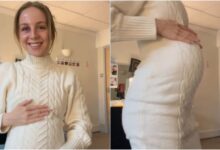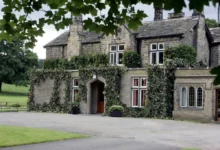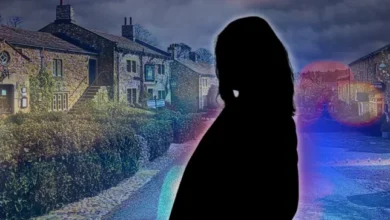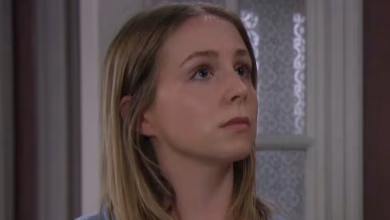‘I’m haunted by Emmerdale storyline, I was blindsided like Chas Dingle’, says woman, 33, who felt stabbing pain in bed
Plus how you can check for breast cancer now
EMMERDALE’S much-loved character, Chas Dingle, made a difficult decision to have a double mastectomy in last night’s episode, later breaking down in tears.
For Clare Etherton, the scenes were an emotional to watch, having undergone a similar operation just days ago in the hope of beating breast cancer.



Like Chas, played by Lucy Pargeter, Clare was also diagnosed with triple negative breast cancer – a disease that affects 8,000 women every year in the UK.
And just as the Emmerdale soap favourite – aged 46 – discovered she’d inherited a faulty BRCA gene, so too did 33-year-old Clare.
It meant she was genetically more at risk of developing cancer due to her family history – but Clare had never known until it was too late.
Had she realised her risk, Clare may have been eligible to have a mastectomy – an op to remove the breasts – to prevent breast cancer years prior.
Now as Chas Dingle tells her friends and family she wants to have a bilateral mastectomy to hopefully prevent the cancer returning, Clare admits watching the scenes will be a poignant reminder of her own journey, which began last July.
She told The Sun: “It is a little surreal to watch Chas have the same operation I have just undergone, a lot of the same emotions were there.
“It is a choice that is difficult to come to terms with, but at the same time a small sense of relief.
“I want to share my story to remind everyone that young women are increasingly being diagnosed with breast cancer.
“I was completely blindsided by it all and I wish I had known about the many things I’ve learnt along the way.
“I have found watching some of the scenes with Chas’ diagnosis and journey emotionally triggering to watch because of my own key moments.
“Lucy Pargeter, who plays Chas, is representing the emotions well and I can really relate to everything.”
Chas’ friend and lover, Dr Liam Cavanagh, first noticed a lump on her right breast.
But for Clare, it was a stabbing pain that first drew her to a lump, also on the right breast.
She says: “I leant across my bed and I felt a sharp stabbing pain that drew me to touch my breast.
“I felt the lump and it felt quite big. It was as if it had almost popped up overnight and it was impossible to miss.”
Trying to remain calm, Clare, who lives near Brighton, visited her GP who immediately referred her for further tests at Sussex County Hospital.
I was on my own at the appointment as I thought everything was going to be alright. It was so horrible.
Clare
“Eight days later, I was called in to the breast clinic on July 19,” she recalls.
“But it was an NHS strike day and unfortunately I didn’t receive a guided biopsy but a core biopsy that doesn’t involve an ultrasound.
“I received a letter saying it was benign but as they weren’t 100 per cent sure, they called me in for another biopsy, this time a guided one.
“I tried to control my mental train of thought as best I could and remained hopeful it was benign.”
It was a huge shock then when Clare was told by doctors she had triple-negative breast cancer a month after her first visit on August 16th, with a lump 40mm in diameter.
She says: “It was a very surreal experience and such a massive shock.
“I was on my own at the appointment as I thought everything was going to be alright. It was so horrible.
“I hadn’t heard of triple-negative breast cancer before but once they started talking about my course of treatment, I knew it was very serious.”
Reality kicking in
Triple negative breast cancer accounts for 8,000 of the 55,000 breast cancers diagnosed each year in the UK. Around four per cent of cases are in women aged 39 and under.
In early September, Clare started eight gruelling rounds of chemotherapy treatment and “lost so much confidence” as her long, dark hair fell out.
It was a blow to find out I was a BRCA carrier after being diagnosed with breast cancer as there are so many preventative measures that can be put in place, but I try not to dwell on the ‘what if’s’.
Clare
Clare, who has a partner of two years but lives on her own, says some days during the three months of treatment were far tougher than others, and moved in with her mum to cope.
She says: “I was on high levels of steroids and my body swelled up. I wasn’t getting much sleep either.
“Some days I found myself in tears, others I was very positive – it’s been such a massive rollercoaster.”
It was a couple of months into her treatment that Clare also discovered she was carrying a faulty BRCA1 gene.
Having a variant BRCA gene greatly increases a woman’s chance of developing breast cancer and ovarian cancer.
Clare’s grandmother on her paternal side had been diagnosed with breast cancer at the age of 42 and then subsequently died of ovarian cancer seven years later.
Clare says: “I was often asked by doctors if there was any breast cancer in the family but because I referred to her as my grandmother, I think the feeling was she must have been old. Consequently, I wasn’t put on high risk.
“But I wasn’t aware of her age or that she had also developed ovarian cancer until after my diagnosis. This highlights the importance of knowing family history and receiving genetic testing.”
Clare’s grandmother had died in the 1970s – before she was born.
Determined to not dwell on the ‘what if’s’, Clare said: “Like Chas, I discovered I had inherited a faulty BRCA gene a few months later [after diagnosis].
“It was a blow to find out I was a BRCA carrier after being diagnosed with breast cancer as there are so many preventative measures that can be put in place, but I try not to dwell on the ‘what if’s’.”


With chemo completed in January, Clare underwent surgery to have both breasts removed – just as Chas is preparing to do – in February, determined to never go through it all again.
She says: “Triple-negative breast cancer is aggressive and so I, too, opted for a double mastectomy.”
Clare must await a pathology report to determine whether she will need radiotherapy or not but is feeling positive about recovery.
“Something like this has made me re-evaluate my whole outlook on life and made me think ‘Right, what is it I want?’ and to do all the things that I may have put on hold previously,” she says.
“In a way, it has completely changed me into a more focused, driven, and confident person as life is too short.”
But she adds: “My treatment means I have been put into chemical menopause.
“Ideally I should have frozen my eggs before my treatment but I didn’t have time as I waited an additional two weeks for the re-testing of my biopsy because of not being able to have the generic biopsy on a strike day.
“The most important thing for me is that my cancer doesn’t hopefully ever return.
“I’m feeling stronger and I hope younger women do read my story today or watch Emmerdale and think ‘Hang on, is there something I should look into?'”
Mammograms to check the breasts for potential cancer are offered as routine screenin gon the NHS for women aged between 50 and 70.
Women may be able to have a mammogram every year over the age of 40 or an MRI scan each year under the age of 40 depending on the results of genetic testing.
*If you’ve been affected by Chas’ storyline or are looking for information and support, call Breast Cancer Now team of expert nurses on its free Helpline on 0808 800 6000, or email our Ask Our Nurses service. Alternatively, more information can be found at www.breastcancernow.org







